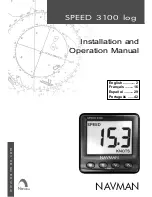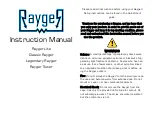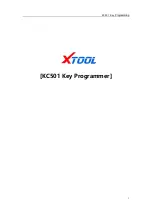
INTRODUCTION
1-3
4.
Do not transport at speeds over 20 MPH under good
conditions. Never travel at a speed which does not
allow adequate control of steering and stopping.
Reduce speed if towed load is not equipped with
brakes.
5.
Avoid sudden stops or turns because the weight of
the implement may cause the operator to lose control
of the tractor. Use a tractor heavier than the
implement.
6.
Use caution when towing behind articulated steering
tractors; fast or sharp turns may cause the implement
to shift sideways.
7.
Keep clear of overhead power lines and other
obstructions when transporting. Know the transport
height and width of your implement.
Attaching, Detaching, and
Storage
1.
Do not stand between the tractor and implement
when attaching or detaching implement unless both
are not moving.
2.
Block implement so it will not roll when unhitched
from the tractor.
3.
Store in an area where children normally do not play.
Maintenance Safety
1.
Understand the procedure before doing the work.
Use proper tools and equipment.
2.
Make sure all moving parts have stopped.
3.
Do not make adjustments or lubricate implement
while it is in motion.
4.
Block the implement so it will not roll when working
on or under it to prevent injury.
High Pressure Fluid Safety
1.
Escaping fluid under pressure can be nearly invisible
and have enough force to penetrate the skin causing
serious injury. Use a piece of cardboard, rather than
hands, to search for suspected leaks.
2.
Any fluid injected into the skin must be surgically
removed within a few hours or gangrene may result.
3.
Avoid the hazard by relieving pressure before
disconnecting hydraulic lines.
Protective Equipment
1.
Wear protective clothing and equipment.
2.
Wear clothing and equipment appropriate for the job.
Avoid loose fitting clothing.
3.
Because prolonged exposure to loud noise can
cause hearing impairment or hearing loss, wear
suitable hearing protection, such as earmuffs or
earplugs.
Chemical Safety
1.
Agricultural chemicals can be dangerous. Improper
use can seriously injure persons, animals, plants, soil
and property.
2.
Read chemical manufacturer's instructions and store
or dispose of unused chemicals as specified.
3.
Handle chemicals with care and avoid inhaling
smoke from any type of chemical fire.
4.
Store or dispose of unused chemicals as specified by
the chemical manufacturer.
Prepare for Emergencies
1.
Keep a First Aid Kit and Fire Extinguisher handy.
2.
Keep emergency numbers for doctor, ambulance,
hospital and fire department near the phone.
Tire Safety
1.
Tire changing can be dangerous and should be
performed by trained personnel using correct tools
and equipment.
2.
When inflating tires, use a clip-on chuck and
extension hose long enough to allow you to stand to
one side, not in front of or over the tire assembly. Use
a safety cage if available.
3.
When removing and installing wheels use
wheel-handling equipment adequate for the weight
involved.
Содержание VT Plus 7550
Страница 16: ...2 8 F 987 0519 STANDARD SPECIFICATIONS Table provided for general use NOTES...
Страница 21: ...ASSEMBLY INSTRUCTIONS 3 5 Table provided for general use NOTES...
Страница 27: ...ASSEMBLY INSTRUCTIONS 3 11 Table provided for general use NOTES...
Страница 53: ...ASSEMBLY INSTRUCTIONS 3 37 Table provided for general use NOTES...
Страница 60: ...3 44 F 987 0519 ASSEMBLY INSTRUCTIONS Table provided for general use NOTES...
Страница 65: ...ASSEMBLY INSTRUCTIONS 3 49 Table provided for general use NOTES...
Страница 77: ...OPERATION AND MAINTENANCE 4 9 Table provided for general use NOTES...
Страница 83: ...OPERATION AND MAINTENANCE 4 15 Table provided for general use NOTES...
Страница 85: ...OPERATION AND MAINTENANCE 4 17 Table provided for general use NOTES...








































